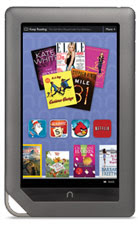Jeff Bezos, CEO of Amazon, recently confirmed what I'd always assumed, that Amazon doesn't make any money on its ereaders or tablets. Bezos said:
"We want to make money when people use our devices, not when people buy our devices."This differs markedly from Apple's strategy. My question: Can it work? I've always wondered how much more, on average, a consumer buys through Amazon after purchasing an ereader or tablet.
Well, now I know! Bezos remarked that "users' appetite for media appeared to grow once they owned one of his devices." (Is it just me, or does that sound ominous? Makes me think of alien mind-altering technology. You will buy more. No? Just me? Okay ...)
"What we find is that when people buy a Kindle they read four times as much as they did before they bought the Kindle.People read four times as much! Wow.
"But they don't stop buying paper books. Kindle owners read four times as much, but they continue to buy both types of books."
Read the entire BBC article here: Kindle Fire HD and Paperwhite sales make Amazon no profit.
Thanks to PG for mentioning it.
Other articles you might like:
- Kristen Lamb: Don't Let Trolls Make You Crazy
- How To Format A Word Document For Amazon's KDP Publishing Program
- Penelope Trunk Discusses Time Management
Photo credit: James Duncan Davidson from Portland, USA




